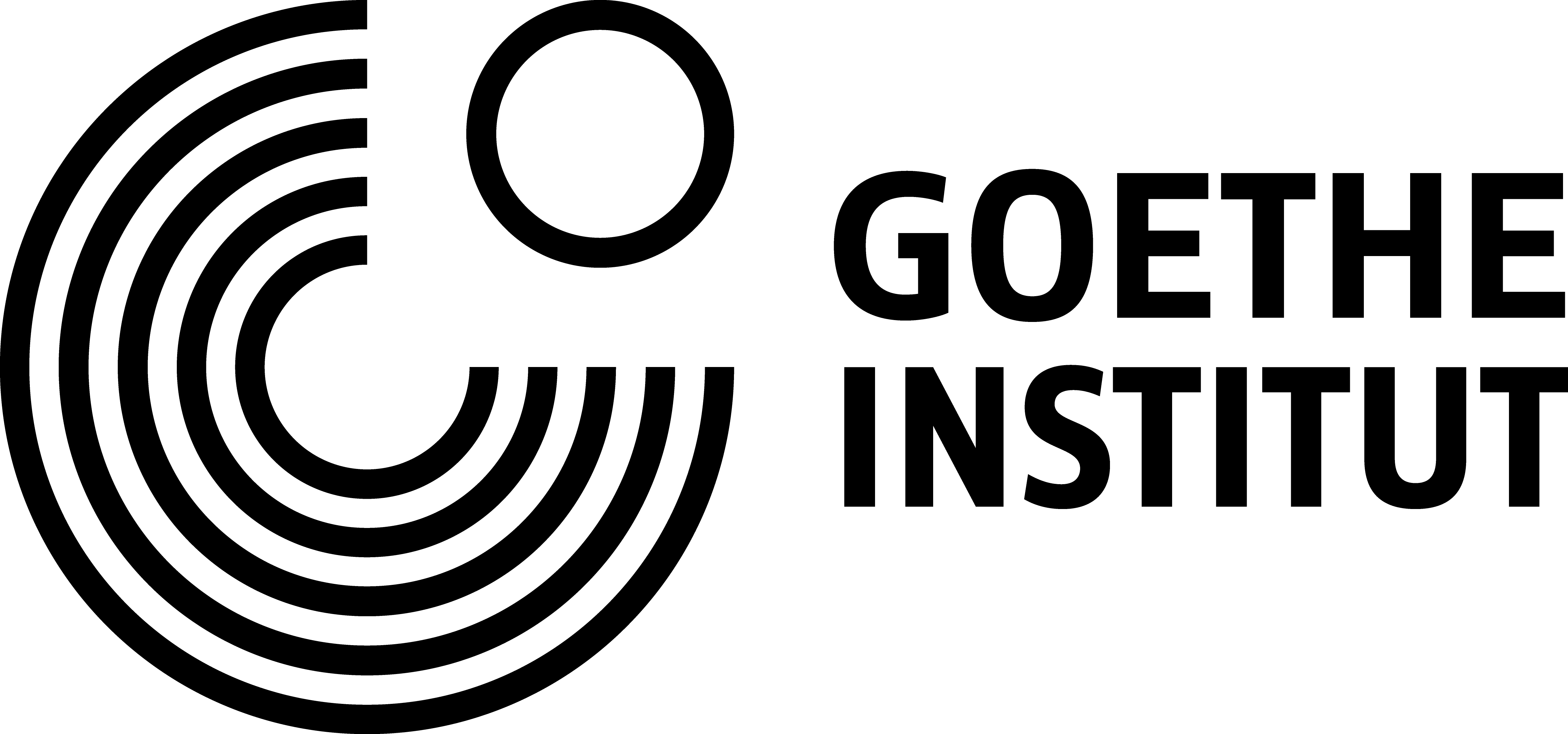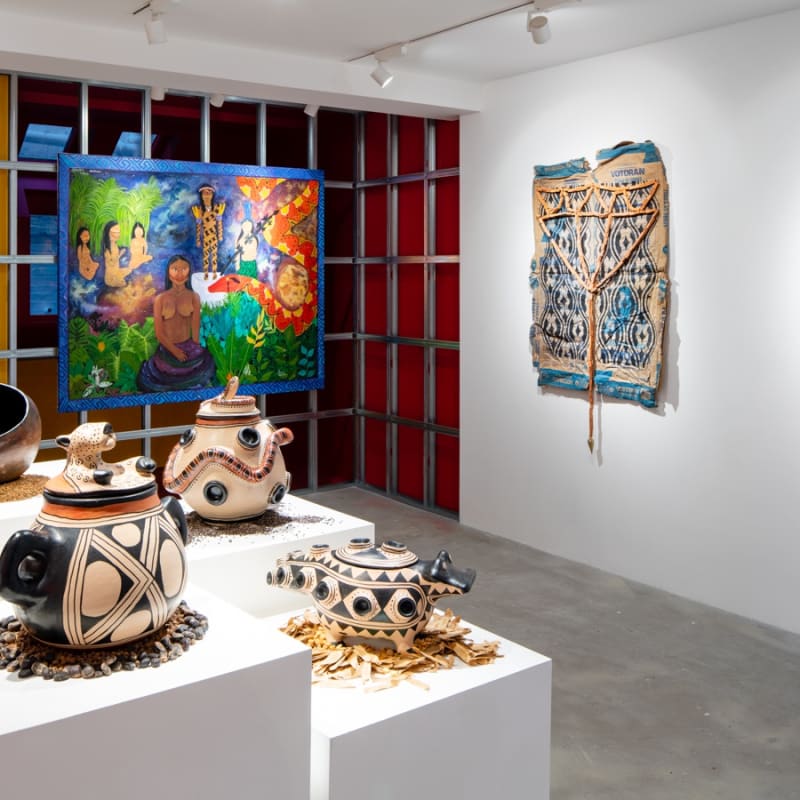Ka’a Body curators Sandra Benites and Anita Ekman, exhibiting artist Denilson Baniwa, Carlos Papa and Cristine Takua of the Maracá Institute in Brazil, and historian Freg J. Stokes, of the University of Melbourne, discuss the curatorial concept behind the exhibition. Moderated by Paradise Row Director Nick Hackworth.
The talk will centre on contemporary Indigenous art as a translation of the Indigenous cosmovisions of the tropical forests of Brazil (The Amazon and the Atlantic Rainforest) and as an expression of different Indigenous resistance strategies in this body-territory. The exhibition analyses the links between London, the city in which this show is taking place, and the history of devastation in the Atlantic Rainforest, of which only 8% of the precolonial coverage remains today. The project emphasises the need to construct global links through art, for the protection of biomes which even today contain the greatest concentration of biodiversity on the planet.
Ka'a Body is supported by the Goethe-Institut London and Nicole Bainov.
About the speakers:
Denilson Baniwa is an Indigenous artist from the Baniwa people. He currently lives and works in Niterói in Rio de Janeiro state. As an activist for the rights of indigenous peoples, he has been giving lectures, workshops and courses since 2015, working mainly in the south and southeast regions of Brazil and also in Bahia.
In 2018, he held the exhibition “Terra Brasilis: o agro não é pop!” (Terra Brasilis: agro is not pop!), at the Art Gallery of the Fluminense Federal University (UFF), also in Niterói, as part of the project “Brasil: A Margem” (Brazil: The Margin), produced by the university. In the same year, he participated in the artist residency of the fourth edition of the Corpus Urbis Festival, held in Oiapoque, Amapá. He has been in exhibitions at CCBB, Pinacoteca of São Paulo CCSP, Hélio Oiticica Cultural Center, Museu Afro Brasil, MASP, MAR and the Sydney Biennial. Besides being a visual artist, Denilson is also a publicist, digital culture producer and hacker, who contributes to the construction of indigenous imagery in various media such as magazines, films and tv series. In 2019, he was nominated for the PIPA Prize and won the online category of the prize.
Sandra Benites, a Guaraní Nhandeva woman, is the first Indigenous adjunct curator of Brazilian art at the Assis Chateaubriand São Paulo Art Museum (MASP). She is currently undertaking a PhD in social anthropology at the National Museum of the Federal University of Rio de Janeiro (UFRJ). She has an MA in social anthropology from the same institute. In 2018 she was the curator of the exhibition Dja Guata Porã | Rio de Janeiro indígena together with José Ribamar Bessa, Pablo Lafuente and Clarissa Diniz in the Art Museum of Rio (MAR). Subsequently, she has participated in a diverse range of cultural and educational events concerning the role of Indigenous women and Indigenous art in Brazil.
Anita Ekman, born in the Atlantic Rainforest (São Paulo, 1985), is a Brazilian visual and performance artist and a researcher of rock art, Pre-Columbian art and rainforest history. Her collaborative performances in archaeological sites explore women's roles in art and history, proposing an expansion of the conceptual horizon of the Atlantic World. In 2021, she received a prize from the French embassy in Brazil and the Goethe Institute in 2021 to conduct a curatorial investigation of archaeological and ethnological collections in museums for the project: "Ore ypy rã - The Time of Origins: A History of Rainforests in Indigenous Cosmovisions".
The Instituto Maracá is a non-governmental organisation established in 2017 by indigenous leaders and non-indigenous professionals. It aims to protect, disseminate and value the historical, environmental and cultural heritage of indigenous peoples.
Carlos Papá
Carlos Papá Mirim is an Indigenous leader and filmmaker of the Guarani Mbya people, in the village of Rio Silveira, state of São Paulo, Brazil. He is a Board Member of the Instituto Maracá and representative for the north coast of SP of the Guarani Yvy rupa commission (CGY). Papá Mirim has been working with audiovisual productions for more than 20 years, with the aim of strengthening and valuing the Guarani Mbya culture through documentaries, films and cultural workshops for young people. He also acts as a spiritual leader in his community, participating in collective decisions and aiding those around him to live well.
Freg J. Stokes is a PhD candidate in History at the University of Melbourne. His doctoral thesis maps Guaraní resistance in the Atlantic Rainforest of South America, during the emergence of capitalism (1500-1768). He has written for Jacobin, Crikey, Overland and The Lifted Brow.
Cristine Takuá
Cristine Takuá is an indigenous philosopher, educator, and artisan who lives in the village of Rio Silveira, state of São Paulo, Brazil. She is Director of the Instituto Maracá. Takuá currently serves as a representative within the indigenous education group of the Education Secretariat in São Paulo, and is also a founding member of the Forum for the Articulation of Indigenous Teachers in the State of São Paulo (FAPISP).

